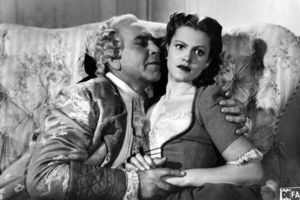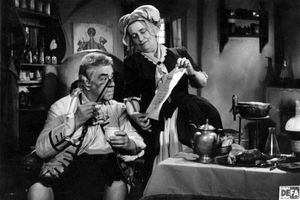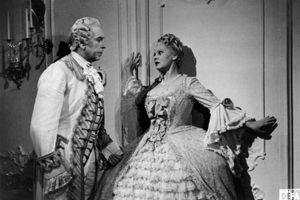Figaros Hochzeit
Director: Georg Wildhagen, 109 Min., Black-White, Feature Film
Deutsche Demokratische Republik (DDR)
DEFA-Studio für Spielfilme, 1949
- Film/Video Format
- 35 mm
- Length in m
- 2975
- English Title
- Marriage Of Figaro
- Premiere Date
- Release Date (for Cinema)
- Literary Source
- da Ponte, Lorenzo: "Die Hochzeit des Figaros"; Mozart, Wolfgang Amadeus: "Figaros Hochzeit", Oper

(Dir.: Georg Wildhagen, 1949) Graphic Design: Kurt Geffers
Short Summary (English)
Count Almaviva's valet, Figaro, plans to marry the Countess's chambermaid, Susanna. The Count, who also fancies his wife's chambermaid, is not particularly pleased about the pending nuptials, but he must - with great reluctance - agree to the marriage plans.
There is, however, also someone who is in pursuit of Figaro. In a thoughtless moment, Figaro promised that he would marry Dr. Bartolo's housekeeper Marcellina. Despite the fact that Figaro's promise was not freely given - the housekeeper lent Figaro 2000 thalers on the condition that he marry her - Marcellina still demands that the terms of their agreement be honored. Only after it becomes known that the jilted housekeeper is in actual fact Figaro's own mother is he able to escape the impending marriage.
The days are composed of many different embroilments and intrigues which act to impede the marriage plans of Susanna and Figaro. The Count is always coming up with new excuses to further postpone the wedding. And then the Count unexpectedly catches the page Cherubin, who is hopelessly in love with the Countess, at his favorite past-time:
namely dilly-dallying around with the girls in the castle - for example, with Barberina, the gardener's daughter and with Susanna, whom he especially enjoys chatting to. The Count, however, simply will not brook such behavior, he quickly decides to ship Cherubin off to the military which would mean a further postponement of the planned wedding. But working together, the Countess and Susanna are also able to prevent this delay.
Now finally the nuptials can commence. The Count has given his final consent only because Susanna has agreed to a clandestine rendezvous with him. However, it's not Susanna, but the Countess, wearing her chambermaid's clothes, who meets the Count at the appointed rendezvous. The Count, after being caught out, is ashamed of himself and repentant Susanna now finally marries Figaro, and Cherubin and Barberina also become a couple.
Source: Progress Film-Verleih

(Dir.: Georg Wildhagen, 1949) Photography: Eduard Neufeld

(Dir.: Georg Wildhagen, 1949) Photography: Eduard Neufeld
Film Crew
- Director
- Script
- Camera
-
- Eugen Klagemann
- Karl Plintzner
- Film Editing
-
- Hildegard Tegener
- Cast
-
- Angelika Hauff (Susanna)
- Willi Domgraf-Fassbaender (Figaro)
- Sabine Peters (Gräfin Rosine)
- Mathieu Ahlersmeyer (Graf Almaviva)
- Elsa Wagner (Marzelline)
- Viktor Janson (Dr. Bartolo)
- Alfred Balthoff (Basilio)
- Franz Weber (Don Curzio)
- Ernst Legal (Antonio)
- Willi Puhlmann (Cherubino)
- Ursula-Katharina Mayberg (Barbarina)
- Theodor Vogeler (Schreiber)
- Egon Vogel (Gärtner)
- Ewald Wenck (Notenschreiber)
- Gustav Püttjer (Reitknecht und Verschwörer)
- Assistant Director
-
- Carl von Barany
- Werner Eppelsheim
- Production Design
-
- Emil Hasler
- Hermann Asmus
- Franz Koehn
- Script Editing
-
- Hans Vietzke
- Music
-
- Wolfgang Amadeus Mozart
- Sound
-
- Karl Tramburg
- Willy Szdzuy
- Musical Performance
-
- Erna Berger (Gesang (Susanna))
- Willi Domgraf-Fassbaender (Gesang (Figaro))
- Tiana Lemnitz (Gesang (Gräfin Rosine))
- Mathieu Ahlersmeyer (Gesang (Graf Almaviva))
- Margarete Klose (Gesang (Marzelline))
- Eugen Fuchs (Gesang (Dr. Bartolo))
- Paul Schmidtmann (Gesang (Basilio))
- Kurt Reimann (Gesang (Don Curzio))
- Willy Sahler (Gesang (Antonio))
- Anneliese Müller (Gesang (Cherubino))
- Elfriede Hingst (Gesang (Barbarina))
- Staatskapelle Berlin
- Artur Rother (Musikalische Leitung / Dirigent)
- Hermann Lüddecke (Chorleitung)
- Costume Design
-
- Walter Schulze-Mittendorff
- Make-Up
-
- Charlotte Stritzke
- Production Management
-
- Walter Lehmann
- Unit Production Management
-
- Ernst Körner
- Hermann von Rhode
- DEFA Photography
-
- Eduard Neufeld
Awards
- Nationalpreis III. Klasse (1953): Für sein Gesamtschaffen, besonders für die Filme "Semmelweis, Retter der Mütter", "Figaros Hochzeit", "Geheimakten Solvay" erhielt der Kameramann den Nationalpreis III. Klasse - Eugen Klagemann
Short Summary (German)
Kammerdiener Figaro möchte die Zofe Susanna heiraten. Graf Almaviva, als Herr der beiden, will sein Recht auf die "erste Nacht" geltend machen. Figaro kommt durch ein früher gegebenes Heiratsversprechen an die alte Haushälterin Marzelline in Bedrängnis. Die Gräfin ist eifersüchtig auf Susanna. Und der Page Cherubin ist unsterblich in die Gräfin verliebt. Die vielen Verwicklungen und Intrigen bringen die Hochzeit in Gefahr. Doch Figaro rettet sie mit List und Geschick, trägt zur Versöhnung von Graf und Gräfin bei und bringt Letzteren dazu, endlich auf das unmenschliche "Recht auf die erste Nacht" zu verzichten.
(Quelle: Das zweite Leben der Filmstadt Babelsberg. DEFA-Spielfilme 1946-1992)
Short Summary (Other Languages)
Figaro, cameriere personale del Conte d'Almaviva, vuole sposare Susanna, cameriera della Contessa. Ma il Conte pretende di far valere lo ius primae noctis. La Contessa è gelosa di Susanna, Figaro viene messo alle strette da Marcellina, la vecchia governante che aveva promesso di sposare, e il paggio Cherubino è follemente innamorato della Contessa. Quando gli intrighi rischiano di far saltare il matrimonio, l'astuto Figaro riesce a salvare la situazione, a riconciliare il Conte e la Contessa e a far abolire l'ignobile diritto alla prima notte. (Italienisch)



